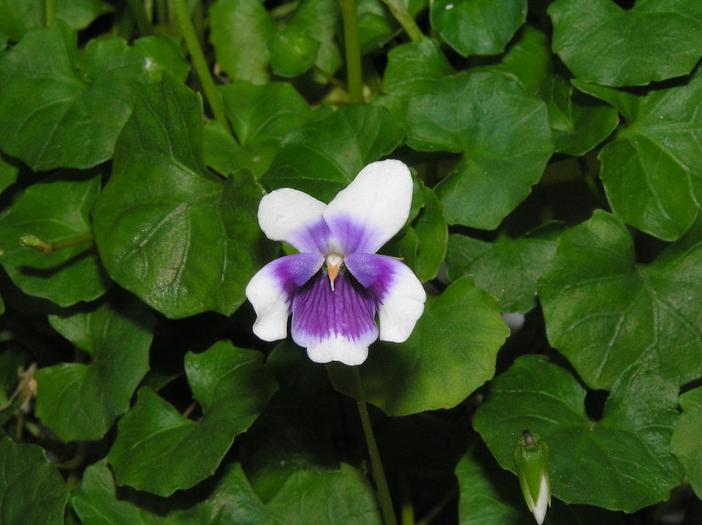Australian Violet
(Viola hederacea)
Australian Violet (Viola hederacea)
/
/

阿橋花譜 HQ Flower Guide
CC BY-SA 2.0
Image By:
阿橋花譜 HQ Flower Guide
Recorded By:
Copyright:
CC BY-SA 2.0
Copyright Notice:
Photo by: 阿橋花譜 HQ Flower Guide | License Type: CC BY-SA 2.0 | License URL: https://creativecommons.org/licenses/by-sa/2.0/ | Uploader: 阿橋 KHQ | Publisher: Flickr

















































































Estimated Native Range
Summary
Viola hederacea, commonly known as Australian Violet, is a perennial herb native to cool, moist forests and grasslands, as well as stream banks in southeastern Australia, including Tasmania. It forms a low-growing mat with a creeping habit, typically reaching 2-4 inches (5-10 cm) in height and spreading indefinitely in favorable conditions. The plant features distinctive, semi-circular leaves that are about as broad as they are long, dark green on the upper surface, and paler beneath. The flowers, which bloom from late winter to early spring, are small and often pale lavender to white with a washed-out appearance, but they can be quite charming when viewed up close. The mature seeds are brown and less conspicuous.
Australian Violet is valued for its ground-covering ability and its tolerance of a range of light conditions, from full shade to part shade. It is often used in gardens for underplanting and filling in gaps where its evergreen foliage can be appreciated year-round. The plant requires consistently moist soil with good drainage and thrives in cool, humid environments. While it is easy to cultivate, it can become invasive in some conditions, spreading rapidly via its rhizomes. It is less commonly grown than its relative, Viola banksii, due to its less robust habit and less striking flowers. However, it is still a useful plant for creating a lush, green carpet in shaded areas.CC BY-SA 4.0
Australian Violet is valued for its ground-covering ability and its tolerance of a range of light conditions, from full shade to part shade. It is often used in gardens for underplanting and filling in gaps where its evergreen foliage can be appreciated year-round. The plant requires consistently moist soil with good drainage and thrives in cool, humid environments. While it is easy to cultivate, it can become invasive in some conditions, spreading rapidly via its rhizomes. It is less commonly grown than its relative, Viola banksii, due to its less robust habit and less striking flowers. However, it is still a useful plant for creating a lush, green carpet in shaded areas.CC BY-SA 4.0
Plant Description
- Plant Type: Herb
- Height: 0.3-0.5 feet
- Width: 0.3-0.5 feet
- Growth Rate: Moderate
- Flower Color: White, Purple
- Flowering Season: Spring, Summer
- Leaf Retention: Evergreen
Growth Requirements
- Sun: Full Shade, Part Shade
- Water: High
- Drainage: Medium, Fast
Common Uses
Bee Garden, Border Plant, Butterfly Garden, Deer Resistant, Fragrant, Groundcover, Low Maintenance, Potted Plant, Showy Flowers, Street Planting
Natural Habitat
Cool, moist forests, grasslands, and stream banks in southeastern Australia, including Tasmania
Other Names
Common Names: Creeping Violet, Trailing Violet, Ivy-Leaf Violet
Scientific Names: , Viola hederacea, Viola hederacea var. petiolaris, Viola hederacea var. elatines, Viola spathulata, Erpetion petiolaris, Erpetion reniformis, Viola hederacea f. lobulata, Viola hederacea var. alba, Viola hederacea var. genuina,
GBIF Accepted Name: Viola hederacea Labill.